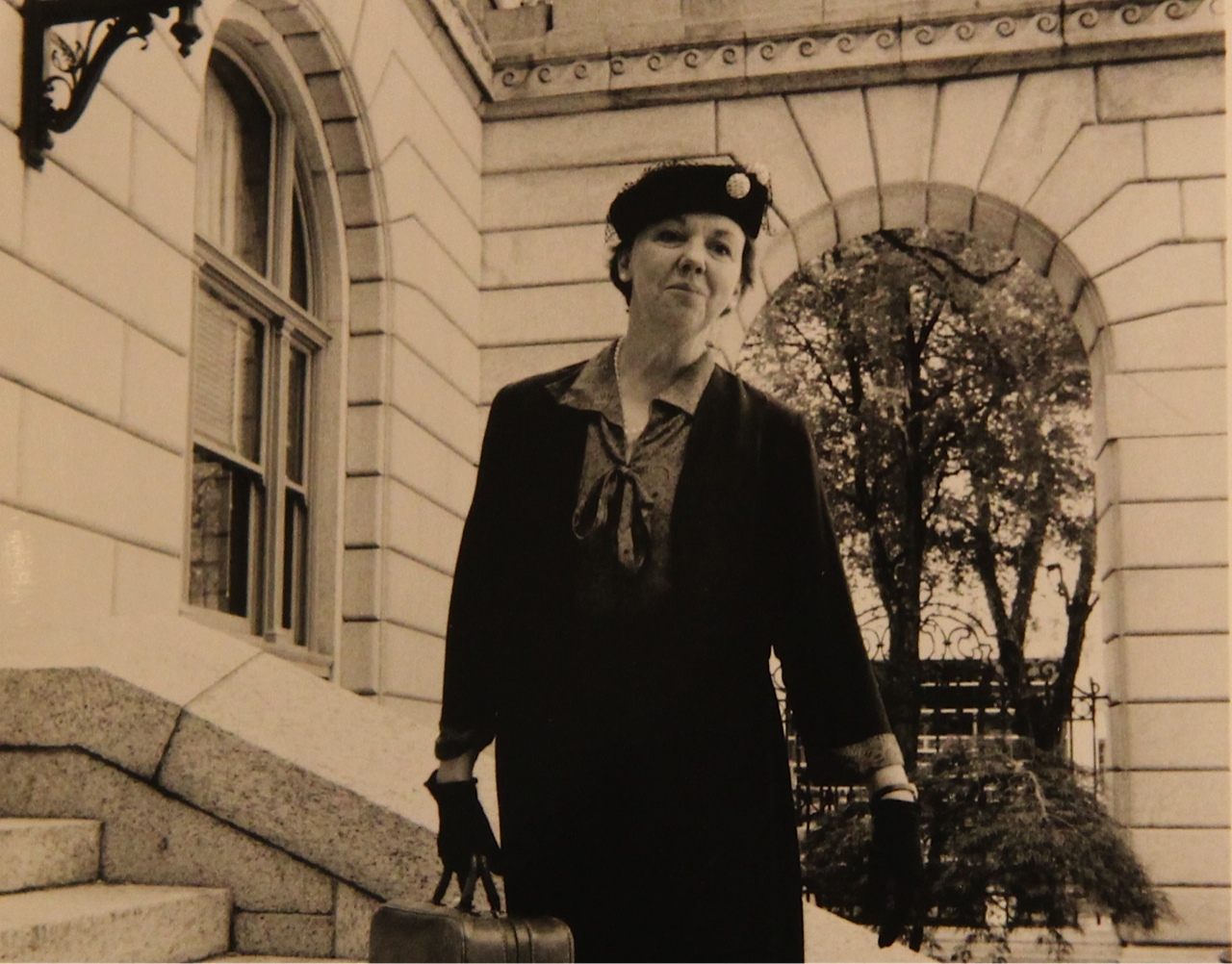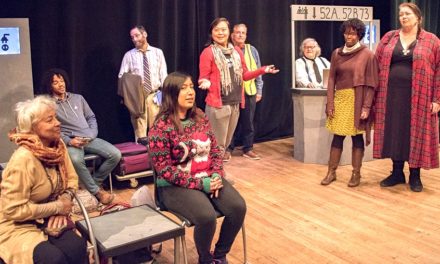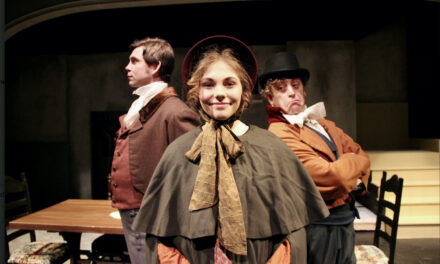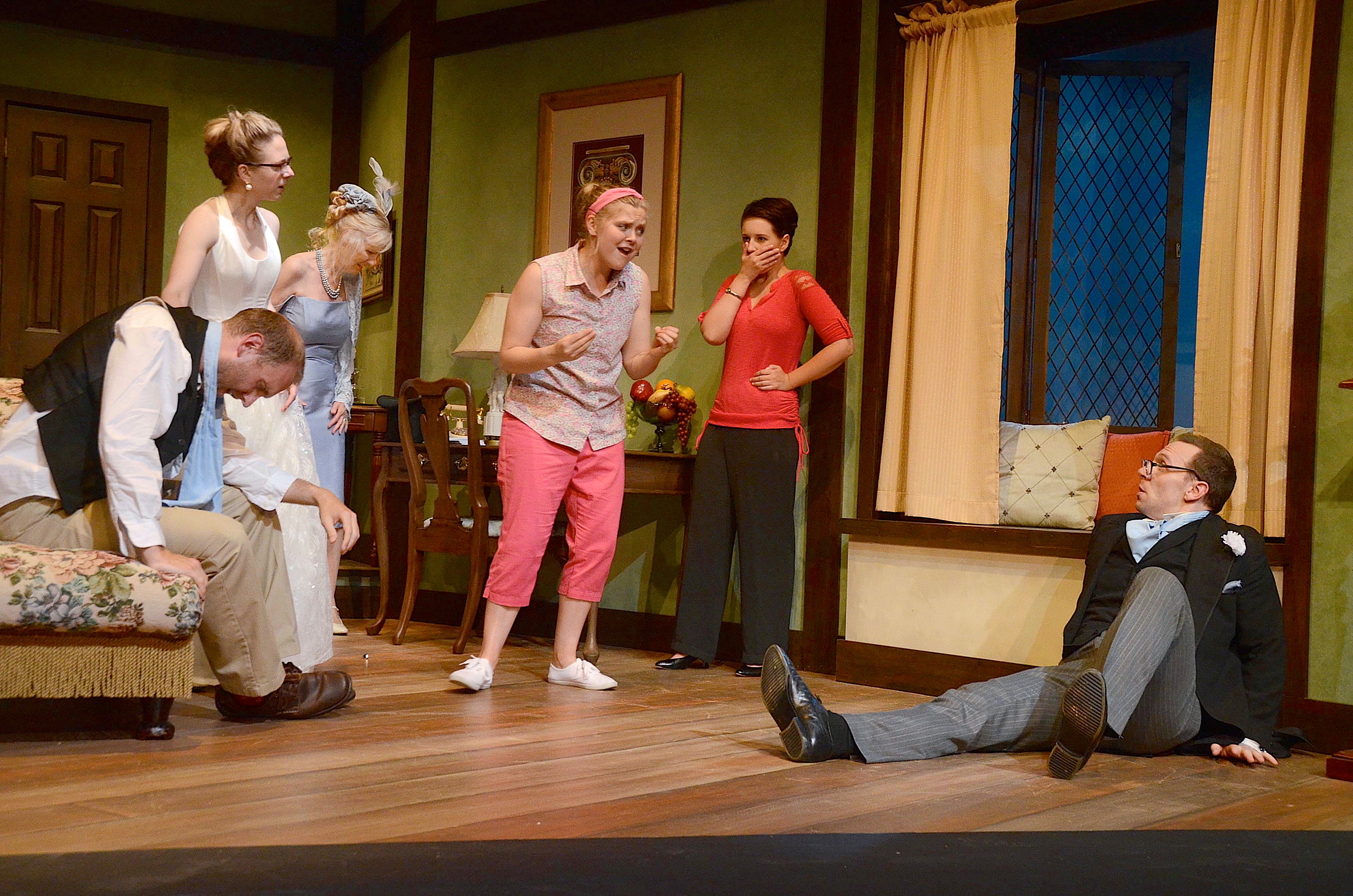By Randi Bjornstad
She said she’s “put 30 characters to bed,” but actress Jane Van Boskirk still has a few favorite American women — the universally admired Eleanor Roosevelt and two Oregon paragons, Abigail Scott Duniway and Tabitha Moffatt Brown among them — that can lure her back onto the stage for one more of her acclaimed one-woman portrayals.

Jane Van Boskirk has portrayed more than 30 outstanding U.S. women in her one-woman plays. Here, she brings Eleanor Roosevelt to life
On April 20 it will be Roosevelt, when Van Boskirk gives a benefit performance that reveals the personality and character of one of the most admired women in U.S. history.
However, the actress does not merely heap on accolades. When Van Boskirk becomes Eleanor Roosevelt, who was the niece of one U.S. president and became the wife of another, her audience comes to know about the dysfunctional family dynamics that scarred her early years, leaving her with insecurities about her self and her worth that she overcame by dint of education and a solid commitment to those less fortunate.
Nor does Van Boskirk gloss over her character’s faults in her show, called “Across a Barrier of Fear,” taken from an Eleanor Roosevelt quote, “Everything I ever did, was always accomplished through a barrier of fear.”
One segment of her performance is a monologue by Eleanor Roosevelt explaining how her own upbringing had left her emotionally distant, a regrettable circumstance that led her to withhold maternal love from her own six children and her regret over that mistake.
But much attention also is given to Roosevelt’s many accomplishments, which included national lecture tours and news conferences — to which she admitted women journalists only — as well as her own writings for newspapers and magazines.
From 1945 to 1951, in its earliest years, she was a U.S. delegate to the United Nations General Assembly, and she subsequently served on the UN Human Rights Commission, where she helped draft the Universal Declaration of Human Rights, which was signed by the nations of the world on Dec. 10, 1948.
“As a child, my parents were pro-Roosevelt all the way,” Van Boskirk said, “I heard a lot about Franklin and Eleanor as I grew up, and I was able to listen to many of her radio speeches, so I was able to ‘get’ her voice.
“I always admired her, so when I started doing one-woman plays, she was one of the people I most wanted to portray, and I have been doing her story for years and years.”
Van Boskirk’s rendition of Eleanor Roosevelt’s life and times is based on a play by Oregon author Sharon Whitney, who has four books — including a 1986 young adult biography of Roosevelt — and more than a dozen prizewinning plays to her credit.
When she and Whitney met, “We became fast friends, and I said, ’Sharon, you should write me a play,” Van Boskirk recalled. “After her book about Eleanor Roosevelt, she looked at the picture and said, ‘Jane!’ ”
She had some help along the way as she developed the Roosevelt character, Van Boskirk acknowledged.
“I have met people occasionally who had actually known her,” she said. “I met someone who had frequently taken tea with Eleanor when she was a young girl and knew someone who worked with her in the West Wing — she talked about how gracious, how open, she was.”
Van Boskirk’s appearances on stage now are a revival of sorts. She’s been doing the plays for 40 years, but experienced a spell of several years when she did not appear, largely because of difficulties experienced within her own family.
“I thought I was completely retired at that point,” she recalled. “I remember I was onstage one night doing a play, and suddenly my mind went completely blank. I said to the playwright, ‘Do you know where I am?’ and everyone thought it was part of the show. But I realized I had to stop.”
Then, five years ago, Van Boskirk attended a reunion of college classmates, all of whom had majored in theater together, at the home of one chum in central New York.
“When I first got there, I was a basket case — I just sat in her garden and pulled weeds,” she said. “But my old friends really encouraged me, saying I had had such a great career, and I should go back to it.”
The rancor and shenanigans of the 2016 presidential election provided the impetus she needed to bring back some of the characters she admired, “and I’ve done shows in Florida, and Baltimore and the Washington, D.C., area now, and I still have five or six more bookings on the East Coast,” she said.
For the present, Eleanor Roosevelt is her sole subject, but that could change, Van Boskirk admitted.
“She’s one of my favorites, but I can be fickle,” she laughed.
Abigail Scott Duniway might be another likely candidate for a reprise. When she was 17 years old and still living in Illinois with her family, Duniway’s father organized a wagon train to Oregon, against his wife’s wishes because of her ill health, and the family set out in March 1852. Her mother died of cholera in June, and her youngest brother died in August, two months before the wagon train reached the Willamette Valley.
Duniway became a school teacher, married and had six children of her own. After her husband was injured in a farming accident, she ran a boarding house, taught again for a year and then opened a millinery and sewing shop in Albany.
In 1871, the family moved to Portland, where she founded a newspaper, “The New Northwest,” focusing on women’s rights, including suffrage.
“Abigail had a dreadful younger brother, Harvey Scott, who was editor of The Oregonian and was really against women’s suffrage,” Van Boskirk said. “She would get up a ballot measure in favor of votes for women, and he would sabotage it in his newspaper.”
By the time Duniway and her female supporters won the right to vote in 1912, women already had the vote in nearby states: Wyoming (1869), Idaho (1896), Utah (1896), Washington (1910) and California (1911).
“She couldn’t accomplish that in Oregon until her brother had died,” in 1910, Van Boskirk said with a hint of triumph.
“That’s why I start my play about Abigail Scott Duniway with, ‘I won, Harvey — I won the right to vote.’ ”
Across a Barrier of Fear
What: Actress Jane Van Boskirk’s one-woman show about the life of Eleanor Roosevelt; play by Sharon Whitney
Where: Wildish Community Theater, 530 Main St. in downtown Springfield
When: 7:30 p.m. on April 20; followed by audience discussion
Tickets: $20, available in advance online at wildishtheater.com/ or 541-868-0223
Details: Sponsored by Eugene Weekly to benefit Planned Parenthood of Southwestern Oregon
Video Clip: janevanboskirk-eleanor.com/video-preview/









